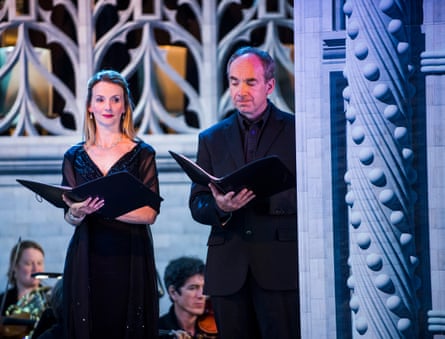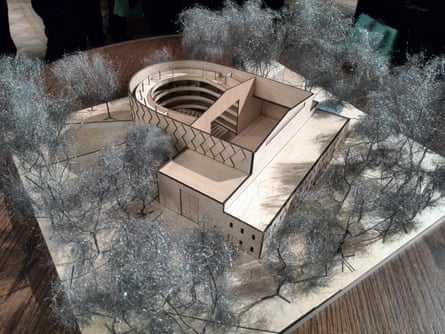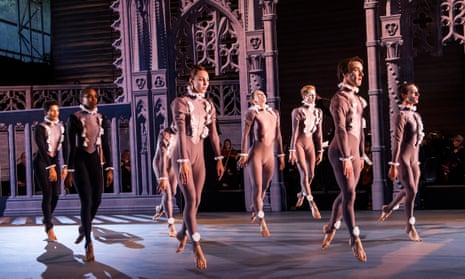The old story that Haydn, on a visit to London in the 1790s, looked down a telescope, glimpsed infinity and rushed away to write the opening “chaos” music of The Creation may be a touch exaggerated. One thing is certain: dark matter was, you might say, in the air. Haydn’s friends included William Herschel, the British-German astronomer-musician who discovered the planet Uranus and a good deal more besides. His observatory was in Slough, and it was his optical instrument through which Haydn peered.
Had he gone a few miles farther up the M40 to the Wormsley estate, home of Garsington Opera, where The Creation was performed this week with dancers from Rambert, Haydn might have found earthly inspiration quite enough: ancient trees, deer on a distant ridge, beings on two legs in curious, dazzling raiments and “great swarms”, to borrow from the oratorio’s English text, of tiny night insects.
This choral masterpiece, as the title suggests, catalogues the six days of creation, using biblical sources and Milton’s Paradise Lost and making audacious play of lion and tiger, birds, whale, worm and waves: it’s a lengthy piece but flies by. A trio of top soloists – soprano Sarah Tynan, tenor James Gilchrist, bass-baritone Neal Davies – relished each aural detail, with terrific contributions from the lean, vital forces of Garsington Opera Orchestra and Chorus. Douglas Boyd, artistic director, conducted with the commitment of one determined to share this masterpiece with an audience perhaps more familiar with opera.

There were cheers for all, though I think many were baffled by the dance element, choreographed by Mark Baldwin and designed – using a flamboyant gothic reredos behind which the orchestra were mainly hidden – by the artist Pablo Bronstein. Dancers were dressed in sleek body suits, bare-footed with tufts of white but no other identifying clues. The fluid leaps, scurries and tumbles were often beautiful but too often distracted, sucking energy from Haydn’s magnificently inventive music. (Overheard: “Every time I want to look at the singers there’s someone wiggling about in front of me”.) This was the last event in the company’s near sell-out season, which has included acclaimed stagings of Eugene Onegin (available to watch online on BBC Arts for six months) and Idomeneo, as well as an extensive outreach programme, to isolated coastal communities and with local schools.
Garsington moved in 2011 from its Oxfordshire home (keeping the name) to a new venue in a neighbouring county. Grange Park Opera, Hampshire, is about to do the same. The curtain came down on two swansong performances of Wagner’s Tristan und Isolde. After 18 years and 55 productions, the company is off to Surrey, leaving behind an enchanting 550-seat theatre, purpose-built within the dilapidated beauty of a Greek revival mansion, which the company has worked heroically to save from total ruin.

Digging has already begun for a new “theatre in the woods” at West Horsley. Sixty per cent of the requisite £10m has been raised. A 99-year lease (and many of the festival’s original donors) suggests continuity, even in the face of Brexit-y uncertainties. It will still be called Grange Park Opera. The Grange itself will host a new festival run by the countertenor Michael Chance. Given the amount of unseen ancillary work done by companies such as Garsington, Grange Park and Holland Park Opera – not least in nurturing young singers – let’s welcome this newcomer.
Wednesday’s Tristan was masterly. There had been cast changes. The result, no complaints, was a potent ensemble led by the British soprano Rachel Nicholls and the American tenor Bryan Register. In a simple staging, the set was borrowed from this season’s Don Carlo. With unfussy lighting and a couple of props, a Spanish cloister had turned into Tristan’s ship. No director was credited. The singers seem, mostly, to have worked it out for themselves. It was an elegant solution. Nicholls already had a good career singing baroque and contemporary music before she added Wagner. She was an exciting Sieglinde in Die Walküre at St Endellion in 2011, conducted by Martyn Brabbins, who was also on the podium at the Grange. In the Ring at Longborough in 2013, she proved a scorching Brünnhilde.

With her gift for expressing emotion, and her ripe, strong voice, Nicholls is an ideal Isolde, currently singing the role across Europe. As Tristan, Register held all in reserve for his merciless Act 3 challenge, fearlessly moulding the role to suit his own mix of lyricism, angst and stamina. Stephen Gadd, as Kurwenal, made loyalty sound endlessly engrossing. Sara Fulgoni was implacable and agonised as Brangäne. Mats Almgren, just seen in Opera North’s Ring, stood in nobly as King Marke.
Praise, above all, to Martyn Brabbins, newly appointed visiting professor of conducting at the Royal College of Music. A musician’s musician, he can turn his hand with ease and perception to anything. His Tristan und Isolde was alive and agile, each act unfurling slowly towards the climax, steady, transparent, explosive. Maybe he should be the next music director of English National Opera.
Star ratings (out of 5)
The Creation ***
Tristan und Isolde ****

Comments (…)
Sign in or create your Guardian account to join the discussion